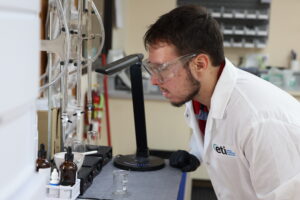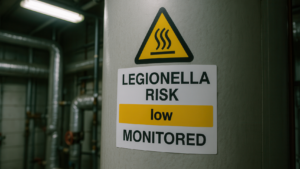Boiler Chemical Treatment is often overlooked by facility operators due to its relatively low cost impact to a facility’s budget, yet it’s one of the most critical factors affecting system efficiency, lifespan, and operational costs for boiler systems and equipment. Without proper chemical formulation selection and treatment, boilers are susceptible to scale buildup, corrosion, and contamination, leading to energy losses, increased maintenance, and unexpected downtime. A well-structured chemical treatment program ensures boilers operate at peak efficiency while extending equipment life and preventing costly repairs.
At ETI, we specialize in tailored chemical solutions designed to optimize boiler performance while meeting industry regulations such as ASME guidelines and EPA discharge standards. Our formulations address the root causes of system inefficiencies while ensuring compliance with permit requirements. This guide covers the best practices for industrial boiler water treatment, the latest chemical innovations, and how ETI’s solutions deliver measurable results in real-world applications.
Key Takeaways
- Consistent water testing and monitoring by a licensed, certified water treatment company are critical for boiler efficiency. Regularly analyzing pH, alkalinity, conductivity, and dissolved oxygen helps prevent scale, corrosion, and costly downtime. Utilizing automated monitoring systems ensures real-time adjustments and optimal chemical dosing.
- Proper chemical treatment prevents corrosion, scaling, and system failures. Oxygen scavengers, alkalinity builders, phosphates, chelants, and dispersants play vital roles in maintaining water chemistry and protecting system components. Failure to manage these factors can lead to heat transfer inefficiencies, energy waste, and premature equipment failure.
- Boiler corrosion inhibitors are essential for protecting metal surfaces. These inhibitors, including oxygen scavengers, alkalinity builders, and filming amines, prevent oxidation, acid attack, and metal deterioration, ensuring long-term boiler integrity.
The Basics of Boiler Chemical Treatment
A best-in-class Boiler chemical program is geared towards controlling pH, alkalinity, hardness, dissolved oxygen, and contaminants to maintain water quality and prevent operational failures. Industrial hot water boilers require precise chemical support to mitigate common issues:
- Scaling: Caused by calcium carbonate, magnesium hydroxide, and silica deposition, which reduces heat transfer efficiency and increases fuel costs.
- Corrosion: Results from dissolved oxygen, low pH, and aggressive ions attacking metal surfaces.
- Carryover & Foaming: Occurs when excessive dissolved solids or surfactants disrupt steam purity
Best Practices for Effective Chemical Treatment in Industrial Boilers
To ensure optimal boiler performance and chemical efficiency, facilities should follow these industry best practices:
Regular Water Testing & Monitoring
Daily testing of pH, alkalinity, conductivity, and dissolved oxygen via a certified water treatment provider is essential to maintaining optimal boiler water chemistry and efficient operation. Utilizing online sensors also allows for real-time monitoring of fluctuations, enabling immediate corrective actions, as well as trending analyses. Following ASME guidelines for feedwater and boiler water specifications ensures compliance and protects equipment from premature failure due to water quality inconsistencies.
Effective Oxygen & Boiler Corrosion Inhibitor
To prevent corrosion, oxygen scavengers such as Diethylhydroxylamine(DEHA) or sulfite should be used to remove dissolved oxygen from the system. Proper alkalinity levels in feed water must be maintained to prevent acidic corrosion in heat transfer areas, preserving the integrity of boiler surfaces. Additionally, metal passivation through oxygen scavenger byproducts, such as the magnetite layer formation of iron oxide promoted by DEHA, adds an extra layer of protection against oxidation.
Preventing Scale & Deposits
Preventing mineral scale formation requires a multi-faceted approach. Hardness precipitation methods using phosphate help control calcium and magnesium scaling. In high-pressure boilers, chelating agents like Ethylenediaminetetraacetic acid (EDTA) are essential for keeping minerals in solution and preventing deposits on surfaces with continuous heat exchange. Additionally, polymer dispersants suspend particulates, reducing the risk of sludge formation and maintaining clean boiler internals.
Optimized Blowdown Control
Controlling boiler blowdown is crucial to maintaining water chemistry balance while minimizing water and chemical waste. Blowdown rates should be adjusted based on total dissolved solids (TDS) measurements to prevent excessive water loss while removing concentrated impurities. Using automated blowdown controllers ensures consistency and efficiency in maintaining water quality. Keeping TDS levels within ASME or boiler manufacturer’-recommended ranges helps protect system components, minimize corrosion, and maintain operational efficiency.
Steam & Condensate Protection
To prevent corrosion in the steam and condensate return system, neutralizing amines like morpholine or cyclohexylamine should be used to maintain proper pH levels. Filming amines can also be applied to create a hydrophobic barrier to carbon dioxide, protecting metal surfaces from carbonic acid attack. Regularly monitoring condensate return quality is critical to preventing the transport of iron and copper throughout the system, which can lead to long-term damage and decreased efficiency.
Boiler Blowdown and Sludge Treatment
Boiler blowdown, while not directly related to chemical selection, is a vital practice for controlling dissolved solids and preventing scale and sludge buildup. Improper handling can waste energy, increase water costs, and create environmental compliance issues.
Advanced Blowdown & Sludge Management Solutions:
While boiler blowdown itself is primarily focused on controlling TDS and removing impurities from boiler water, managing the resulting blowdown wastewater often requires additional treatments. The following advanced sludge and wastewater treatment solutions are typically applied downstream or separately from the boiler itself, ensuring compliance with environmental discharge regulations and overall system efficiency.
- Inorganic & organic coagulants – Facilitate contaminant removal for cleaner discharge.
- Custom coagulant & flocculant blends – Enhance solid-liquid separation for improved internal treatment efficiency.
- Heavy metal precipitants – Ensure compliance with EPA discharge regulations.
Bioaugmentation solutions – Break down organic contaminants in wastewater. - Odor & grease control treatments – Maintain system hygiene and prevent biological fouling.
ETI’s expert technical team assists our water treatment partners with optimizing blowdown strategies, polymer selection, and regulatory compliance to enhance plant efficiency and reduce environmental impact for our distributors’ clients at half the cost.
Vapor Phase Boiler Corrosion Inhibitors (VpCI): Next-Level Boiler Protection
VpCI technology is specifically designed for boiler systems during shutdowns, seasonal layups, or extended idle periods—not for regular operational water treatment. It provides ongoing protection against corrosion when the boiler is offline, preserving equipment integrity and ensuring reliability upon startup.
How VpCI Works:
- VpCI molecules evaporate, forming a protective monomolecular film on metal surfaces.
- This monomolecular film inhibits oxidation even in humid conditions or when the system is offline.
- Effective for boilers, cooling systems, and condensate lines requiring long-term preservation.
Advantages of VpCI Technology:
- Prevents rust & pitting during maintenance shutdowns.
- No need for costly, labor-intensive surface treatments.
- Works for multiple system types, including high-pressure steam systems.
By integrating VpCI protection, industrial operations can safeguard equipment against corrosion, minimize repair costs, and maintain boiler reliability during idle periods.
Partner with ETI for Smarter Chemical Boiler Treatment Solutions
ETI doesn’t just supply chemical treatments but ensures that our water treatment clients keep their clients and customers’ systems running efficiently and cost-effectively. Our streamlined process ensures you get the right products, expert guidance, and hassle-free service every step of the way.
How We Serve Our Boiler Water Treatment Partners
- Assess Your Needs & Make a Recommendation – Our team works with you to analyze steam boiler system performance, water chemistry, and operational challenges to recommend the most effective internal treatment solutions.
- Create Your Product – Whether you need a proven formulation or a custom blend, we develop high-performance chemical solutions that align with your exact specifications.
- Process & Ship Your Order – With reliable production and logistics, we ensure prompt delivery so you get the right chemistry when you need it.
ETI makes water treatment simple, effective, and results-driven. Whether you’re optimizing an existing program or tackling a new challenge, our expertise and high-quality chemical solutions will help you improve efficiency, reduce costs, and extend equipment life. Get in touch today for more details!
Frequently Asked Questions
Why is regular water testing important for industrial boilers?
Regular water testing ensures that key parameters of water system such as pH, alkalinity, conductivity, and dissolved oxygen remain within safe limits, preventing scale, corrosion, and efficiency losses. Without monitoring, unseen chemical imbalances can lead to expensive repairs and downtime.
How do boiler water corrosion inhibitor: inhibitors like oxygen scavengers fight corrosion?
Oxygen scavengers like DEHA or sodium sulfite chemically react with dissolved oxygen in boiler water, removing it before it can cause oxidation and corrosion. Some scavengers, like DEHA, also form a protective passivation layer, further than boiler treatment chemicals shielding metal surfaces from degradation.
What are the risks of improper blowdown control?
Excessive or insufficient blowdown can cause significant safety hazards and problems. Too much blowdown wastes water and chemicals, increasing operational costs. Too little blowdown leads to high dissolved solids, resulting in scaling, foaming, and carryover, which can damage the boiler system.
What role do amines play in steam and condensate protection?
Neutralizing amines adjust the pH of condensate to counteract carbonic acid formation, while filming amines create a barrier on metal surfaces, preventing corrosion and extending the life of piping and return lines.
How can ETI help improve my own boiler feed water treatment program?
ETI provides customized chemical treatment solutions tailored to specific boiler rust water chemistry. Our expertise in oxygen scavenging, scale prevention, blowdown control, and steam protection ensures higher efficiency, lower maintenance costs, and extended equipment lifespan. We also offer water testing services and regulatory compliance guidance to support our partners with their boiler water treatment chemical needs.





